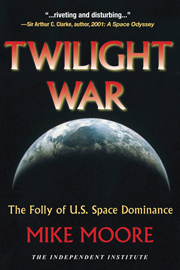For more than 25 years, the United Nations General Assembly has been on record, nearly unanimously, favoring a ban on all space-related weapons. The United States has opposed such a treaty.
Last October, for example, former New York Gov. George Pataki, a U.S. public delegate to the world body, explained America’s position. Though the United States is fully committed to the “peaceful uses of space,” he said, it believes “discussions regarding the merits of treaties to prevent the so-called ‘weaponization’ of outer space would be a pointless exercise.”
Every presidential administration since the early 1980s has taken a similar position. And yet, while asserting there is no need for a treaty, the United States has been actively developing both the doctrine and hardware needed to “control” space in a time of conflict and—possibly—to place weapons into orbit.
Peter B. Teets, then Air Force undersecretary and director of the National Reconnaissance Office, which operates intelligence-gathering satellites, presented the classic rationale for such a policy in 2002: The U.S. military needs space for “collection of all kinds of intelligence, precision navigation and...for weapons delivery, communication and transmission of information to users worldwide.”
“If we do not pursue control of space,” Mr. Teets added, “then someone else will. If we do not exploit space to the fullest advantage across every conceivable mode of war fighting, then someone else will—and we allow this at our own peril.”
He had things backward. Others may pursue space weapons not because the United States fails to do so—but because the United States insists on doing so.
Consider China. Just a year ago, on Jan. 11, 2007, China destroyed an obsolete Chinese weather satellite orbiting some 500 miles above Earth, creating a debris cloud that will circle the globe for decades and threaten other satellites in similar orbits. It was the first space weapons test since 1985, when a U.S. “kinetic-kill vehicle” was used to destroy an old U.S. scientific satellite, Solwind. The United States, of course, recently matched the Chinese accomplishment, destroying a crippled U.S. spy satellite.
The Chinese test drew protests from a host of other nations, including the United States, which owns more than half of the world’s 800-plus scientific, commercial, and military-oriented satellites.
The test was seen by some as the beginning of a new arms race, this time in space. More likely, the Chinese were telling us that if we don’t sit down at the negotiating table in Geneva, they will challenge us in space.
For many years, the Chinese have taken the lead in reminding the world that the 1967 Outer Space Treaty only bans space-based nuclear weapons and other weapons of mass destruction. The Chinese, along with most other nations, say it’s time to prohibit all space weapons.
The Chinese government may be corrupt and repressive but it is not collectively stupid. China learned a live-or-die lesson from the collapse of the Soviet Union: In a direct arms competition with the United States, the United States wins.
The Soviet Union sought to create an alternate universe, a socialist paradise with Muscovite characteristics. It failed. In contrast, China has chosen, cautiously, to join the global community, and it expects the payback for that will be at least a modest degree of national prosperity.
China has no real interest in a Cold War-style military competition with the United States; it would distract them from their main business, the Wal-Marting of America. China wants a new space treaty—not a costly High Noon-in-space showdown.
While Americans have reasons to be concerned about China’s military ambitions, we should take comfort in the fact that China—along with virtually every other space-faring nation in the world—supports the proposed “Prevention of an Arms Race in Outer Space” (PAROS) Treaty.
Ours is a law-abiding nation that seeks to influence the world by example. We should heed China’s warning and seize the opportunity to lead the fight for this long-overdue international agreement. Verifying and enforcing such a treaty would be hugely difficult but would be much more productive than a new-age arms race.








